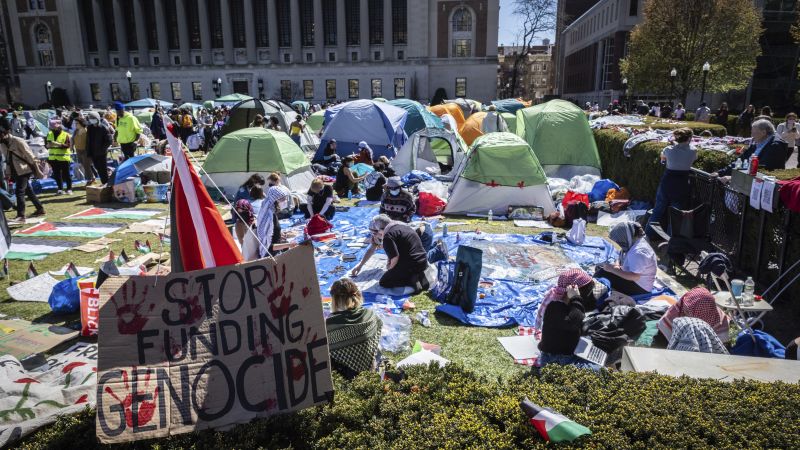
Columbia University extends hybrid classes through end of semester as tense protests prompt safety concerns
CNN
Columbia University faces a seventh day of tense pro-Palestinian demonstrations as solidarity protests have rippled to other colleges and prompted arrests at NYU and Yale.
Columbia University faces a seventh day of tense pro-Palestinian demonstrations as solidarity protests have rippled to other colleges and prompted arrests at NYU and Yale. As Passover week began Monday, escalating campus tensions and growing safety concerns among Jewish students have drawn condemnation from donors, leaders and lawmakers, ramping up pressure on the school president to break up the demonstrations. Here’s the latest. • Columbia goes to hybrid classes amid turmoil: As some students have expressed safety concerns, Columbia said almost all classes on its main campus will be hybrid — technology permitting — until the end of the semester. “Safety is our highest priority as we strive to support our students’ learning and all the required academic operations,” the university said in an announcement Monday night. Organizers of the student protests have said their demonstrations — including a large encampment on one of the school’s lawns – have been peaceful and distanced themselves from non-student protesters who have gathered outside the campus, calling them “inflammatory individuals who do not represent us.” • NYU students and faculty arrested as protests proliferate: New York University students and faculty members were arrested during protests on the school’s campus Monday night, police said. The protest was one of several pro-Palestinian demonstrations that have emerged at major US colleges and universities in solidarity with Columbia’s protests, including at Yale, MIT, Harvard and Boston University. • Jewish students on heightened alert: As the major Jewish holiday of Passover began Monday, Columbia’s Jewish student organizations said they have increased security around their gatherings due to safety concerns, including having a police presence at the campus Jewish cultural center. Before Passover began, a rabbi linked to the university urged students to return home because he believes authorities “cannot guarantee Jewish students’ safety.” • University president boxed in by dueling sides: The university’s president, Minouche Shafik, is facing immense pressure from alumni and lawmakers to rein in the protests, while others say such action would amount to stifling free speech. The Republican-led House Committee on Education called on Shafik Monday to ask police to clear the encampment and expel or terminate any students or faculty who were involved. But the president is already facing criticism from some faculty over her decision to call in the NYPD to disperse a pro-Palestinian protest last week. • University may be violating the law, lawmakers say: Several lawmakers, including a contingent of Jewish representatives that visited the campus Monday, argue the university’s lack of action against the protestors may be violating Title IX, a law that protects students from discrimination and harassment based on their race or nationality. Republican Rep. Virginia Foxx has warned university leaders of consequences if they do not rein in the protests.

Another conference call. This was what strategy looked like on Andrew Cuomo’s mayoral campaign: A small circle of aides and advisers listening to longtime aide Melissa DeRosa, who denied working on his campaign in public but whom all involved knew was running things, as she pressed them about early voting numbers showing the Zohran Mamdani surge was real.

The area of the rural Cascades near Leavenworth, Washington, is so majestic, they call it the Enchantments. Cold, clear water from the wilderness lakes flows into Icicle Creek, where it rushes over sparkling rocks. But the tranquil beauty that draws campers and hikers from all over the country was shattered a month ago by the murders of three little girls only yards from the creek.

As the Trump administration looks to quickly pivot from military strikes to a diplomatic deal on Iran’s nuclear program, the final military and intelligence assessment on the recent US strikes will be critical in informing what the Trump administration needs to accomplish in future Iran negotiations.




















 Run 3 Space | Play Space Running Game
Run 3 Space | Play Space Running Game Traffic Jam 3D | Online Racing Game
Traffic Jam 3D | Online Racing Game Duck Hunt | Play Old Classic Game
Duck Hunt | Play Old Classic Game








